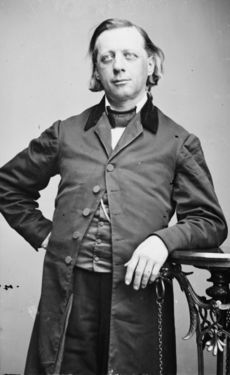Henry Ward Beecher | |
|---|---|
 Beecher, between 1855 and 1865 | |
| Born | June 24, 1813 Litchfield, Connecticut, U.S. |
| Died | March 8, 1887 (aged 73) Queens, New York, U.S. |
| Occupations |
|
| Spouse | |
| Father | Lyman Beecher |
| Signature | |
Henry Ward Beecher (June 24, 1813 – March 8, 1887) was an American Congregationalist clergyman, social reformer, and speaker, known for his support of the abolition of slavery, his emphasis on God's love, and his 1875 adultery trial. His rhetorical focus on Christ's love has influenced mainstream Christianity through the 21st century.[1]
Beecher was the son of Lyman Beecher, a Calvinist minister who became one of the best-known evangelists of his era. Several of his brothers and sisters became well-known educators and activists, most notably Harriet Beecher Stowe, who achieved worldwide fame with her abolitionist novel Uncle Tom's Cabin. Henry Ward Beecher graduated from Amherst College in 1834 and Lane Seminary in 1837 before serving as a minister in Lawrenceburg, Indiana, and later in Indianapolis's Second Presbyterian Church when the congregation resided at Circle Hall at Monument Circle.[2][3]
In 1847, Beecher became the first pastor of the Plymouth Church in Brooklyn, New York. He soon acquired fame on the lecture circuit for his novel oratorical style in which he employed humor, dialect, and slang. Over the course of his ministry, he developed a theology emphasizing God's love above all else. He also grew interested in social reform, particularly the abolitionist movement. In the years leading up to the Civil War, he raised money to purchase slaves from captivity and to send rifles—nicknamed "Beecher's Bibles"—to abolitionists fighting in Kansas. He toured Europe during the Civil War, speaking in support of the Union.
After the war, Beecher supported social reform causes such as women's suffrage and temperance. He also championed Charles Darwin's theory of evolution, stating that it was not incompatible with Christian beliefs.[4] He was widely rumored to be an adulterer, and in 1872 the Woodhull & Claflin's Weekly published a story about his affair with Elizabeth Richards Tilton, the wife of his friend and former co-worker Theodore Tilton. In 1874, Tilton filed charges for "criminal conversation" against Beecher. The subsequent trial resulted in a hung jury and was one of the most widely reported trials of the century.
After the death of his father in 1863, Beecher was unquestionably "the most famous preacher in the nation".[5] Beecher's long career in the public spotlight led biographer Debby Applegate to call her biography of him The Most Famous Man in America.[6]
- ^ Applegate 2006, p. 470.
- ^ "Henry W. Beecher - Ohio History Central". ohiohistorycentral.org. Retrieved April 23, 2023.
- ^ Price, Nelson (2004). Indianapolis then & now (1st ed.). San Diego, Calif. ISBN 1-59223-208-6. OCLC 54066651.
{{cite book}}: CS1 maint: location missing publisher (link) - ^ Henry Ward Beecher (1885). Evolution and Religion. Pilgrim Press.
- ^ Scharnhorst, Gary (2008). Kate Field: The Many Lives of a Nineteenth-Century American Journalist. Syracuse, N.Y.: Syracuse University Press. p. 47. ISBN 978-0815608745.
- ^ Michel Kazin (July 16, 2006). "The Gospel of Love". The New York Times. Retrieved May 18, 2013.